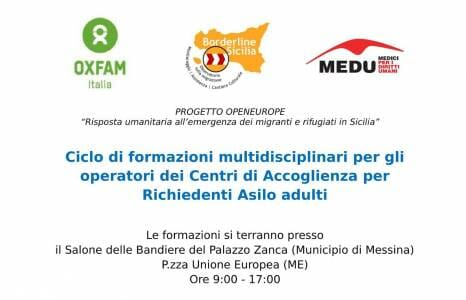The arrivals continue at Lampedusa. Survivors’ testimonies of the shipwreck of 11 October, “the Libyans shot at us”
Lampedusa is still receiving new arrivals of
migrants, mainly from Syria
and the Horn of Africa but also from some West African countries, particularly Ghana. Nights
ago migrants arrived at the Favaloro pier, transported by Coast Guard patrol
boats. The 14 migrants from Somalia
and Eritrea were found in
the hold of a boat that was taking on water off the coast of Libya. Some of
the Somalis who arrived in Lampedusa recounted that all the other fleeing
migrants had been transferred from their boat into an unidentified ship with
Libyan personnel and Bengalese, to be taken back to Libya. These 14 had been the
exception since they had been physically unable to climb up onto the deck from
the hold where they were later found. They were abandoned at sea, until the
Italian patrols spotted them.
Yesterday afternoon and evening a
number of migrants managed to reach the waters of the island, spotted just a
few miles from the port, and this morning a large boat carrying an approximate
150 Syrians and Siro-Palestinians, including 15 children, arrived at the
island. Lampedusa’s CSPA has thus become saturated once more, reaching the
level of overcrowding that we saw one week ago; currently about 950 migrants,
of which about 75 are children. This morning the alleged smuggler of this last
boat was arrested, an Italian speaking Tunisian already known to the workers on
the island, having been stopped four times previously, always having had got
away with just a fine.
Meanwhile the transfer of the coffins containing
the Eritrean victims of the shipwreck of 3 October continued. A crowd of
workers, journalists and the families of the victims rallied around the point
of transhipment at the commercial dock. There was much emotion. Relatives and
survivors were indignant that they wanted to be there for the final farewell of
their deceased countrymen. There were screams of pain and anger, there was the tension
of those who still have not found the remains of their family members, or have
not been able to identify them, and there was the exhaustion of those searching
desperately to make sense of this still unexplained tragedy.
Indeed still the testimonies about the unfurling
of events of the shipwreck off the Tabaccara, remain unclear. Yesterday, in the
crowd waiting for the victim identifications, formed in front of the entrance
of the Police Station of Lampedusa, some survivors were able to confirm with
more clarity some of the information previously reported on this site. One
survivor referred to a big ship and other smaller “plastic” boats,
light red in colour, having approached the boat the night of the tragedy, doing
two laps around it before disappearing into the darkness. The captain had
already run down the SOS torch lights and could not restart the engine which
had just shut down. At that point, a migrant, fearing that he had by now lost
his only chance to be saved, had set fire to a rag with a lighter, waving it in
the air in the hope of making himself seen. The clothes of the migrant must
then have caught fire, and in an attempt to save themselves, they threw the rag
to the ground, setting fire to the whole of the wooden boat.
Following this, we also heard testimonies
regarding the events of the shipwreck of Friday night, which took place in
Maltese waters, 70 miles
from Lampedusa. One of the survivors, who arrived on the island on the same
evening as that of the tragedy, explained that the boat, which was carrying 450
Syrian and Siro-Palestinian migrants, was flanked by a Libyan ship on which
there were four people armed with rifles, shooting at the refugees. When they
tried to move away from this ship, the boat must have been damaged and, while they
continued to motor on, the boat began to take on water, tipping the boat to an
almost perpendicular angle, until it nosedived.
Borderline Sicily is currently working on both
fronts, trying on the one hand to support those affected by the death of the
Eritrean migrants who died in the shipwreck eleven days ago and facilitate the
identification of the bodies of their loved ones, and on the other hand, in
collaboration with the operators IOM and the Italian Red Cross, to help Syrian
and Palestinian survivors in the CSPA to get in touch with family members who
have been transferred to Malta.
The wave of arrivals affecting the island seems
relentless and from the dock boats are all the time coming and going, both the
Guardia di Finanza and the SAR of the Port. All this while, just today, the
Council of Ministers is discussing the reinforcement of sea patrols in the
Strait of Sicily, which should start in these days, with the aim, it seems, of
spotting boats as soon as possible and escorting them to their destination.
Yet to be spoken of, not even during the visit
of the leaders of the Italian Government and the European Commission last week,
are the push-backs at sea. Something that must have annoyed the Lega Nord
campaigner who ran to the island armed with flags of the Lega Nord and
screaming for the expulsion of migrants, who remained in disbelief and indignant
at the behaviour of the Lampedusans and the workers on the island who have
rather, at this time, demonstrated a great shared-pain in the face of these
events, providing food, clothing and in some cases their homes.
The Editors of Borderline Sicily Onlus



